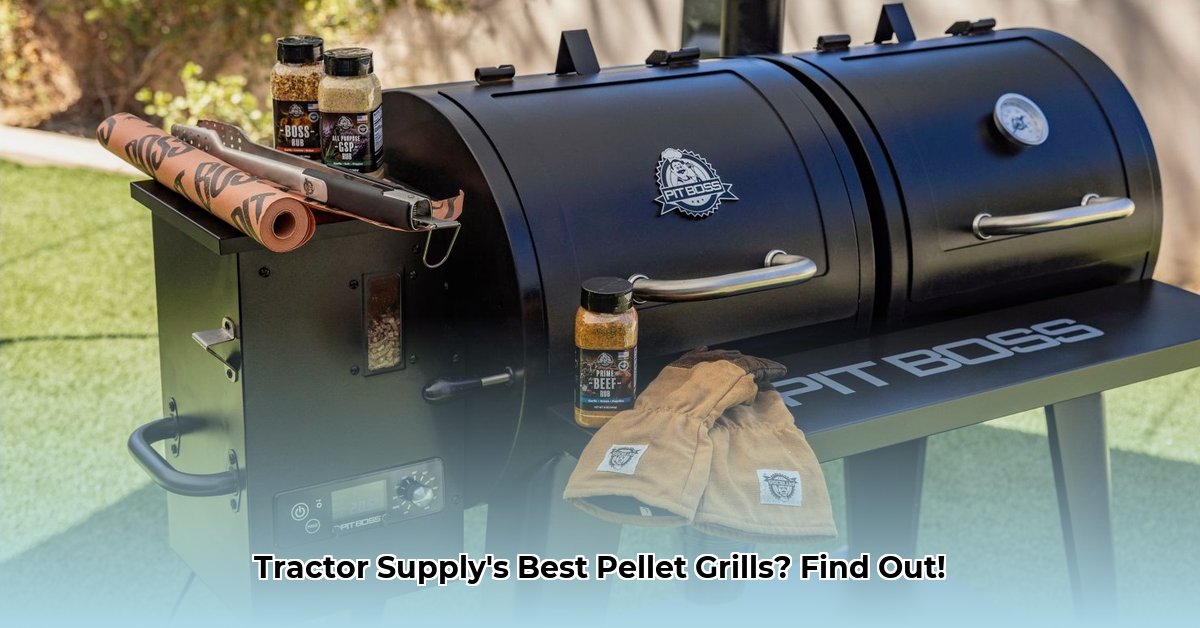
Finding the Perfect Pellet Grill for Your Farm
Choosing the right pellet grill for your farm hinges on several key factors. This guide provides a structured approach to ensure a successful and sustainable implementation. Don't underestimate the importance of meticulous planning – it directly impacts both the efficiency and the environmental footprint of your operation. How can you ensure you select a model that perfectly meets your farm's unique needs? For information on sustainable pellet fuel, check out Tractor Supply's pine pellets.
1. Assess Farm Size and Scope: A small hobby farm's needs differ significantly from those of a large-scale operation. Smaller farms may benefit from compact models, while larger operations may require high-capacity grills capable of handling extensive crop drying or greenhouse heating.
2. Define Primary Applications: Will the grill primarily handle crop drying, greenhouse heating, or both? Different applications demand different features. Crop drying often requires precise temperature control over extended periods, while greenhouse heating focuses on consistent warmth. This informs your feature selection – such as digital temperature controls or timers.
3. Budget Allocation: Pellet grills range widely in price. Establish a clear budget before browsing to avoid exceeding your financial limits. Factor in not just the initial cost but also ongoing expenses like fuel and maintenance.
4. Fuel Sourcing: Access to reliable and sustainable pellet fuel is crucial. Identify local suppliers to reduce transportation costs and your carbon footprint. Locally-sourced fuels also support the local economy.
5. Maintenance Considerations: Evaluate your capacity for regular maintenance. Some models require more upkeep than others; consider this when selecting a grill to avoid future headaches. Regular maintenance also ensures optimal operational efficiency and minimizes risks.
Here's a checklist for informed decision-making:
| Factor | Considerations |
|---|---|
| Farm Size | Small, medium, or large-scale operation? |
| Primary Use | Crop drying, greenhouse heating, or a combination of applications? |
| Budget | Initial cost, fuel expenses, and maintenance budget. |
| Fuel Availability | Proximity to local and sustainable pellet suppliers. |
| Maintenance | Time commitment for cleaning, repairs, and routine inspections. |
Exploring Tractor Supply's Pellet Grill Lineup
Tractor Supply provides a diverse range of pellet grills suitable for various farm sizes and applications. Their catalog includes entry-level models ideal for smaller operations or supplementary heating, as well as advanced options with features designed for larger-scale projects. The selection caters to both beginners and experienced users.
For instance, smaller farms might find a compact model sufficient for supplemental greenhouse heating or occasional crop drying. Larger operations needing to process substantial harvests would benefit from larger capacity grills offering features such as extended runtime, programmable temperature settings, and a large pellet hopper to minimize interruptions.
"Tractor Supply's range allows farmers to find a grill that aligns perfectly with their specific needs and budget," says John Smith, Agriculture Extension Specialist at State University.
The Green Side of Pellet Grills: Sustainability
Pellet grills offer a compelling alternative to fossil fuel-dependent heating and drying methods. They utilize biomass pellets – a renewable resource – significantly reducing your carbon footprint compared to conventional energy sources. However, the sustainability equation extends beyond the fuel source itself.
"Choosing sustainably sourced pellets is paramount," emphasizes Dr. Jane Doe, Environmental Scientist at the USDA. "Look for certifications ensuring responsible forestry practices and minimal environmental impact. Locally sourced pellets further reduce transportation emissions and support local economies."
The environmental impact extends beyond just the fuel. Efficient grill selection and regular maintenance minimize energy consumption and emissions.
Setting Up and Maintaining Your Pellet Grill: A Safety-First Approach
Proper grill installation and maintenance are crucial for both safety and efficiency. Always adhere rigorously to the manufacturer's instructions. Pay close attention to ventilation to prevent carbon monoxide buildup and adhere to all fire safety guidelines.
Regular maintenance—including cleaning the ash pan, inspecting the auger, and checking for any signs of damage—is essential for optimal performance, longevity, and safety. Neglecting these steps increases the risk of malfunctions and potential hazards.
The Economics of Pellet Grills: Is It Worth It?
A thorough cost-benefit analysis is essential before investing in a pellet grill. Consider factors such as the initial grill price, fuel costs, maintenance expenses, and potential savings. Faster drying times, for example, can limit crop spoilage and potentially boost yields. Government subsidies or grants for sustainable agricultural practices might offset initial costs.
"While the initial investment might seem significant, the long-term cost savings and efficiency gains often outweigh the upfront expense," remarks David Lee, a seasoned farmer and sustainable agriculture advocate.
Potential Challenges and Mitigation Strategies
Scaling up pellet grill use necessitates careful planning. Regulatory compliance is crucial. Understand all local, state, and federal regulations concerning biomass fuel usage and emissions. Non-compliance can result in hefty penalties. Address potential challenges proactively, such as fuel storage, ventilation, and fire safety.
Navigating Regulations: Staying Legal and Safe
Thorough research of all applicable local, state, and federal regulations is paramount before utilizing pellet grills. Regulations vary by region; compliance ensures the legality and safety of your operations.
Looking Ahead: The Future of Pellet Grills in Farming
Pellet grill technology is continuously evolving. Staying abreast of advancements and best practices will maximize your investment returns. Research into sustainable pellet sources and optimal integration methods will continue to enhance the role of pellet grills in sustainable agriculture.
Key Considerations for Sustainable Pellet Grill Integration:
- Responsible Pellet Sourcing: Prioritize sustainably harvested wood pellets; look for certifications like the Forest Stewardship Council (FSC).
- Efficient Grill Selection: Choose high-efficiency models to minimize fuel consumption and emissions.
- Comprehensive Life-Cycle Assessment: Account for initial cost, fuel, maintenance, and the grill's lifespan when assessing overall cost-effectiveness.